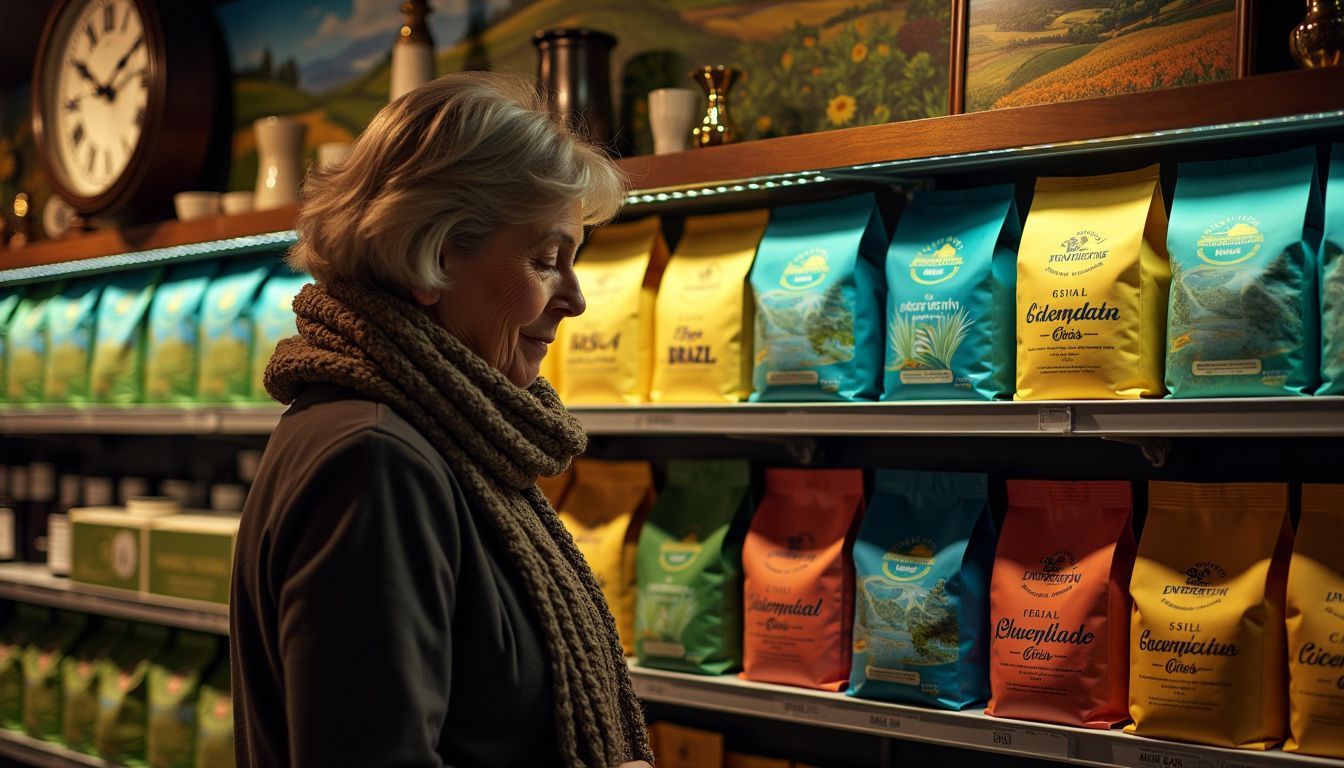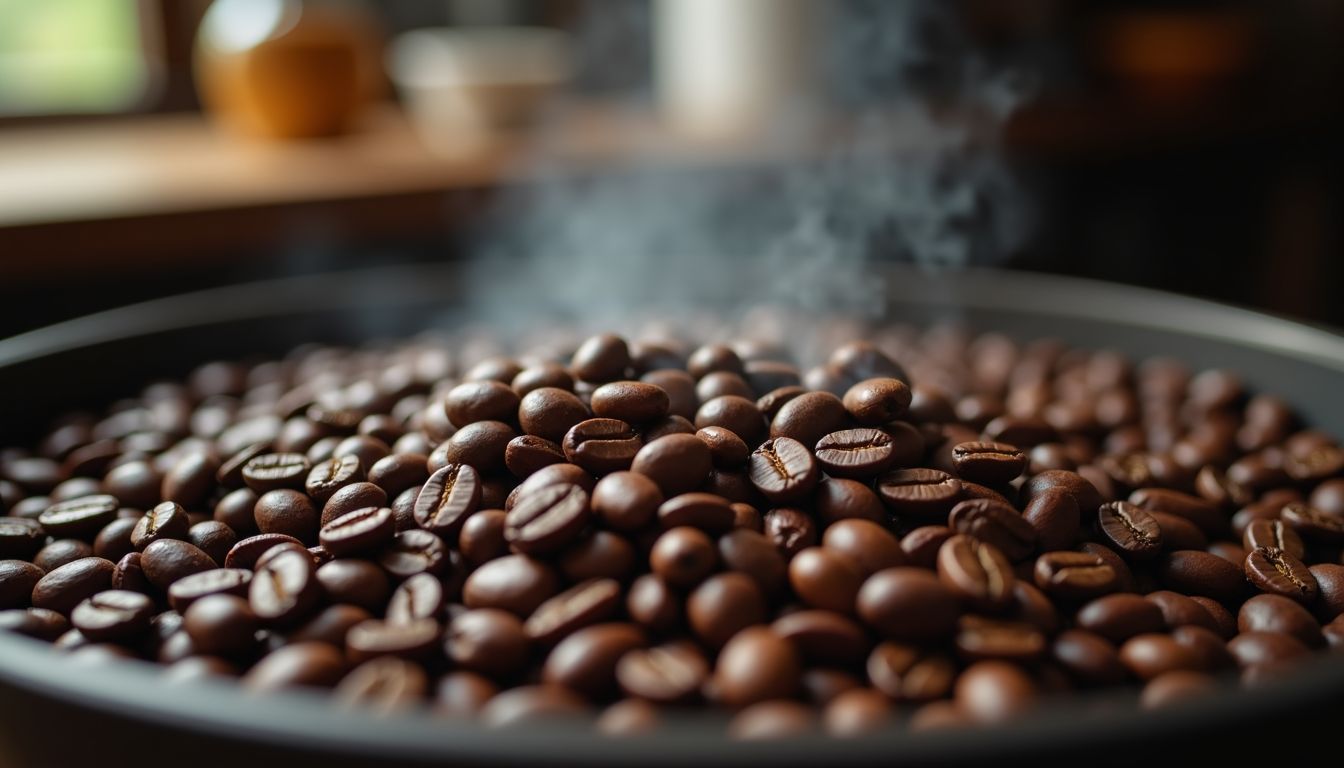Blog
Where Does the UK Get Most of Its Coffee From?
Curious about the UK’s main source of coffee? Many UK coffee lovers enjoy their daily brew without knowing its origin. An interesting fact to note is that in 2022, the UK imported millions worth of coffee from various countries worldwide.
This article will simplify the complex topic of coffee imports into the UK. You’ll gain knowledge about the main exporting countries, favourite bean types among Brits, and the reasons behind these choices.
Eager for more information? Continue reading for an in-depth understanding of British coffee preferences and trends.

How Popular Is Coffee in the UK?
In the UK, people drink about 98 million cups of coffee every day. This shows that coffee is very popular in Britain.
Coffee Consumption Statistics
You must see how much coffee people in the UK drink daily. Here are the facts:
| Statistic | Details |
|---|---|
| Daily Coffee Consumption | 98 million cups |
| Growth in Consumption | From 70 million cups per day to 98 million |
| Average per Coffee Drinker | 2 cups daily |
| Preference | Instant coffee is 75% of consumption |
| Frequency | 30% drink several times a day, 24% once a day |
| Economic Contribution | £9.1 billion to the UK economy |
These numbers show the significant role coffee has in the daily life of the UK populace. From the morning cup to its impact on the economy, coffee is a major player.
Cultural Significance of Coffee
Coffee holds a significant position in UK culture. Each week, 80% of individuals frequent coffee shops, indicating their fondness for the beverage. Routine visits are commonplace as well, with 16% stopping by for their preferred drink daily.
Evidently, coffee serves as more than just an early morning stimulant for many.
Various coffee types find favour among the UK population. Lattes sit in the top spot with 35%, followed by Americanos at 28%. Everyone finds something suitable in this selection. Considering the average individual consumes around 528 cups annually, the prominence of coffee in UK life becomes apparent.
Be it a swift espresso or a relaxed cappuccino, these beverages form part of both daily habits and special occasions.

Where Does the UK Get Most of Its Coffee From?
The UK gets its coffee mainly from far off lands. Brazil and Vietnam are big suppliers, sending lots of beans over the sea to British ports.
Top Coffee Exporting Countries to the UK
UK coffee imports reached a staggering £1.1 billion in 2022, demonstrating the deep affection Brits have for their coffee. Much of this is sourced from beyond the European Union, with two nations playing a prominent role.
- Switzerland – While Switzerland doesn’t cultivate coffee, its prominent role in coffee trading and decaffeination technology makes it a significant contributor. A substantial chunk of the UK’s coffee imports transited through Switzerland in 2022.
- Brazil – As the globe’s reigning coffee producer, Brazil leads the chart for UK imports. For instance, the UK purchased £18.4 million worth of Brazilian coffee in June 2024 alone. Brazil is renowned for its enormous arabica plantations and premium beans.
- Vietnam – Being the second-largest global producer with a focus on robusta beans, Vietnam provides the vigorous and daring flavours that grace British mugs.
- Colombia – Blessed with fertile soil and an ideal climate, Colombia is celebrated for its top-tier arabica beans. A large portion of its prime harvests are shipped to meet the desires of UK consumers who appreciate mellow and sweet traits in their coffee.
- Honduras – Emerging as a chief provider, Honduras centres its efforts on both quantity and quality to fulfil UK requirements for diverse tastes and predilections.
- Ethiopia – Being native to the arabica plant, Ethiopia exports the aromatic and fruity coffees that have developed a fan base among specialty coffee connoisseurs in the UK.
- India – Dispensing both robusta and arabica variants, India introduces exotic tastes swayed by distinctive monsoon rains to the British market.
These countries play a significant role in keeping Britain caffeinated, each supplying distinct attributes to cater to varied consumer tastes throughout the nation.
Import Volumes and Trends
In June 2024, the UK bought £106 million worth of coffee. This was a big deal because it showed the UK spent more on coffee than it sold by £88.9 million. From one year to the next, from June 2023 to June 2024, the amount of coffee the UK bought went up by £14.2 million or 15.5%.
This means people in the UK wanted more coffee this year than last year.
Countries like the Netherlands, Belgium, and Indonesia sent a lot more coffee to the UK in June 2024. The numbers are huge – exports from these countries jumped up massively. The Netherlands sent 98.4% more, Belgium’s exports grew by 93.9%, and Indonesia topped them with a whopping increase of 132%.
So, these places played a big part in bringing more coffee into British cups.

What Types of Coffee Beans Does the UK Import?
The UK imports two primary varieties of coffee seeds – Arabica and Robusta. These range from daily use beans to exceptional, high-quality types tailored for coffee enthusiasts.
Arabica vs. Robusta Varieties
Arabica beans and Robusta beans are two main coffee types the UK imports, each with distinct characteristics.
| Feature | Arabica | Robusta |
|---|---|---|
| Caffeine Content | Less caffeine | Double the caffeine of Arabica |
| Flavour | More refined, sweeter with fruity notes | Bolder, more intense, and bitter |
| Production | Around 60% of global coffee | Around 40% of global coffee |
| Popular Growing Regions | Latin America, Ethiopia, and some Asian regions | Africa, Indonesia, Vietnam, and India |
Arabica beans are often viewed as more premium. They require more attention to be grown. Meanwhile, Robusta beans are more resilient. They can thrive in challenging environments. These variations influence the coffee you enjoy. Arabica is for those who appreciate a refined, nuanced taste. Robusta is better suited for those who favour a potent, assertive coffee. This knowledge aids in making informed coffee selections.
Specialty and Gourmet Coffees
You will find that people now want better coffee. These coffees come with unique tastes. They are called specialty and gourmet coffees. People look for coffee from one place or farm because it tastes different and often better.
These special coffees follow good steps in making them. Farmers do not use harmful chemicals. They save water and reduce waste too. Roasters try new ways to roast beans, which changes how your coffee tastes.
This makes sure you get a great cup every time.

Why Does the UK Source Coffee From These Countries?
The UK chooses coffee from these countries for their rich tastes and unique profiles. Their long history with coffee trade plays a big part, too.
Quality and Flavour Profiles
Brazil, Ethiopia, Kenya, and Rwanda send the UK coffee with distinct tastes. Brazil’s beans are sweet with hints of nuts and chocolate. They have low acidity. Ethiopia’s coffees vary a lot because they come from ancient varieties.
Each has its own taste. Kenya offers beans with berry flavours and sharp, wine-like acidity. Rwandan coffee gives deep fruit tastes and feels syrupy in your mouth.
These countries grow high-quality beans that make British cups of coffee special. Knowing where your coffee comes from helps you understand its unique flavour. Whether it’s the rich sweetness from Brazil or the fruity notes from Rwanda, each type adds something special to the UK’s coffee scene.
Historical Trade Relationships
The UK gets most of its coffee from Brazil, Vietnam, Colombia, Honduras, and Ethiopia. These countries have been trading with the UK for many years. Brazil is the biggest supplier, giving 30% of the UK’s coffee.
Vietnam comes next with 20%, mostly providing Robusta beans that make instant coffee. Colombia focuses on specialty Arabica beans and supplies about 15%. This trading pattern goes back a long time.
In these relationships, the types of beans vary greatly. The UK prefers Arabica for its rich flavours but also imports Robusta for stronger blends like espresso and instant coffees.
This mix shows how tastes in the UK have shaped imports from these countries over time, keeping quality high and choices wide for British drinkers.
How Does the Coffee Supply Chain Operate?
The coffee supply chain starts with farmers growing coffee plants. Then, the beans travel around the world to reach your cup.
Production and Processing Methods
Coffee grows on farms. People pick the beans by hand or with machines. Here’s how it turns into the coffee you drink:
- Growers plant coffee trees in large fields or small gardens.
- Workers harvest ripe cherries from these trees, either by hand-picking or using machinery.
- They then remove the flesh of the cherry to get to the coffee bean inside. This can be done in two ways – wet processing or dry processing.
- In wet processing, they soak the cherries in water to loosen the flesh.
- After soaking, machines help to remove the flesh and skin.
- The beans are then dried, either in the sun on large patios or using drying machines.
- Once dry, workers sort the beans by size and weight.
- The next step is roasting, where beans turn brown and get their flavour.
- Roasters use big machines to heat the beans to about 200°C.
- After roasting, they cool down and pack them for selling.
Every step needs care to make sure your coffee tastes good.
Transportation and Logistics
The process of transporting coffee to the UK consists of numerous stages, each one subject to tight regulations. Here’s the process in detail:
- Coffee beans are harvested by farmers in countries such as Brazil, Vietnam, and Colombia.
- Following harvest, the beans are packed into large bags, often crafted from materials like hessian fabric.
- To conduct overseas coffee exports, exporters are required to have suitable licensing, proving regulatory compliance.
- Inadequate roads and other infrastructure issues can cause delays in coffee transportation.
- Roasters may establish direct connections with farmers, creating a more efficient pipeline for coffee to reach the UK.
- Typically, the beans are transported to the UK via sea freight.
- Upon arrival in the UK, the coffee is transported via lorries to roasting facilities or retail outlets.
- At the roasting facilities, the green beans are transformed into the roasted coffee that is beloved by many.
- Practices guided by fair trade principles make sure farmers are adequately rewarded for their coffee production.
This describes the journey of coffee, from cultivation to your cup in the UK.
What Is the Role of Fair Trade in UK Coffee Imports?
Fair Trade makes sure farmers get paid fairly for their coffee. It also helps improve their lives and work conditions.
Ethical Sourcing Practices
Ethical sourcing practices make sure coffee farmers get a fair pay. This helps them have a stable income. Fairtrade sets up rules for this. Farmers are paid at least a minimum price that covers their costs of growing the coffee sustainably.
Also, they learn how to farm better and use water wisely.
This way of doing things is good for everyone. It means you can enjoy your cup of coffee knowing it was grown in a way that helps people and does not harm the planet. Many coffees in the UK now come with Fairtrade or Rainforest Alliance certificates.
These show that the beans were grown following these good practices.
Impact on Coffee Farmers
Fairtrade certification helps coffee farmers a lot. It makes sure they get minimum prices for their beans. This stops them from being poor. In 2018, these farmers got €76.6 million in extra money from Fairtrade.
They used this for services and projects in their communities.
Buying high-quality speciality coffee also aids growers. They can sell their beans for more than the Fairtrade price. This means better earnings for them and more money to improve their lives and farms.
So, when you buy these coffees, you support hard-working growers around the world.
How Does Climate Change Affect Coffee Imports to the UK?
Climate change hits coffee farms hard. It messes with weather and growing conditions in lands near the equator, making it tough to grow beans. This could mean less coffee for the UK and higher prices.
Effects on Producing Regions
Climate change will cut coffee yields and land by 2050. Farms in the Americas, making 55.5% of world’s coffee, face risk. Arabica beans are more at risk than Robusta due to climate changes.
Droughts get worse, pests increase, and there is less diversity in plants and animals. These issues make growing coffee harder in these areas.
Adaptation and Sustainability Efforts
The UK coffee industry is highly considerate of environmental well-being. The impulse to adapt and promote more sustainable practices is on the rise. Here is why:
- RiSE Coffee is committed to procuring coffee that contributes positively to the environment. They collaborate with partners to address climate change.
- The Friendly Coffee Fund allocates funds to coffee cultivators. This aids them in adopting farming techniques more favourable to the environment.
- Current UK regulations call for more diligence in tracing the origin of coffee. This prevents potential deforestation.
- Coffee retailers and vendors have a preference for beans transported in environmentally friendly packages.
- Certain coffee farms are adopting water-saving techniques and improving land preservation.
- Fair trade provides a reasonable compensation to farmers, enabling them to maintain their farms without resorting to deforestation.
- Studies on new variants of coffee plants tolerant to higher temperatures are in progress.
- The dissemination of knowledge to farmers on maintaining soil health is crucial.
- Initiatives to repurpose coffee waste as fertilisers or for other products are gaining traction.
- The adoption of solar power and other renewable energy sources at coffee processing facilities is becoming more prevalent.
These actions demonstrate a committed step in ensuring coffee cultivation remains environmentally friendly whilst still satisfying the UK’s penchant for an excellent cup of coffee.
How Do UK Coffee Roasters Influence the Market?
UK coffee roasters shape tastes and trends. They pick beans from around the world, roast them locally, and sell fresh flavours to shops and online buyers.
Local Roasting Industry
The UK’s love for quality coffee grows stronger. Local roasters are leading this charge with freshly roasted, high quality beans. They use special ways to roast coffee that brings out unique flavours.
This push for better taste has made many people choose local brands over big names.
Demand for these craft coffees is up, and the market will grow by 2.23% from 2024 to 2029. Roasters in the UK focus on sourcing beans that are good for the planet and fair to farmers.
This means more people can enjoy great coffee that’s kind both to those who make it and the Earth.
Trends in Consumer Preferences
You like your coffee with taste. Almost two-thirds of you say the flavour is why you drink it. You also prefer to have your coffee at home, not out. Four in five make their coffee at home, choosing instant most times.
You care about where your coffee comes from now more than before. You want to know it’s okay for the planet and fair for the farmers. Labels that say “Fair Trade” matter to you. So does knowing exactly how much caffeine is in your cup.
These things change why and what kind of coffee you buy.
What Are the Future Trends for Coffee in the UK?
Looking ahead, the UK coffee scene will lean into green practices and tech. Expect more eco friendly beans and smart brewing gadgets to hit the market.
Sustainability and Innovation
Sustainability and innovation are key for the future of coffee in the UK. Arabica crops face risks from climate change, but solutions are coming. People are turning to robusta beans, especially high-quality ones, because they’re tougher against climate problems.
Liberica coffee is also getting noticed for its unique taste and tough nature.
Innovations like koji fermentation improve robusta coffee by making it less bitter and adding new flavours. This method shows how technology can make coffee better and help it deal with climate issues.
The UK’s market is looking at these changes to keep offering great coffee while caring for our planet.
Emerging Market Dynamics
The UK coffee market will grow slowly, reaching £2.17 billion by 2028. People want more special and eco-friendly coffees. They also like trying new flavours and recipes. Many choose instant coffee from brands like Nescafé for home use.
Own-label instant coffees are getting more popular.
Stores now sell a wider range of fairtrade and organic options. This is because customers care about where their coffee comes from. They prefer buying from companies that pay farmers well and look after the earth.
The UK’s interest in these types of coffee keeps growing each year.
Conclusion
Coffee holds a prominent spot in the UK’s daily life, with a multitude of people indulging in the beverage regularly. The majority of the UK’s coffee importation originates from regions such as Brazil and Vietnam.
Our coffee landscape is primarily dominated by two leading varieties of coffee beans, namely Arabica and Robusta. Additionally, an array of exceptional tasting coffees also grace the market shelves.
The origin of their coffee holds significant interest for the UK populace. They exhibit a preference for ethically sourced products that promote fair trade practices and contribute positively to environmental sustainability.
As a result, there’s a growing trend towards purchasing an increased amount of fair trade and organic coffees.
Climatic changes can pose significant challenges to coffee cultivation in various regions. Nevertheless, the UK is actively coordinating with these countries to mitigate these issues.
Numerous UK establishments take pride in roasting their own coffee beans. This practice enables them to create their own distinctive blend of flavours that are cherished by consumers.
Take a moment to reflect on your upcoming coffee indulgence. What’s its origin? What’s the nature of its production process? The selections you make have the potential to bolster virtuous initiatives worldwide.
Let’s make a conscious decision and continue to relish our delightful coffees as a community!



